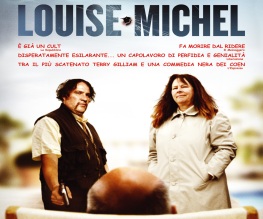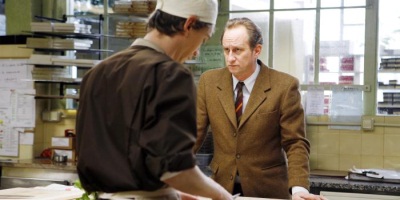Louise-Michel

In absurdist philosophy, the Absurd refers to the perpetual and inescapable existential vacuum that is the human condition – and the impossibility of filling that void in a universe that grants no meaning. As a means of resolving this dilemma, absurdism offers three choices for mere mortals – suicide, religion, or resignation. That is, of course, until French filmmakers Gustave de Kervern and Benoît Delépine proposed a fourth option – gender reassignment.
De Kevern and Delépine’s work of comical lunacy follows the bumbling trail of unlikely couple Louise (Moreau), an illiterate female textile worker who has just been made redundant, and Michel (Lanners), a contract killer whose occupational ineptitude has left him as desperate for cash as his lady(ish) counterpart. The socially rejected twosome come together in a ridiculous scenario where Louise heads up the search for a professional killer to knock off her double-dealing boss and stumbles upon Michel, a poor substitute, but her only option available. Louise and Michel then enter into an unorthodox partnership and soon realise that they have more in common than simple economic frustration and subversive intellect. What ensues is an excess of expected absurdity and bizarre charm, with innumerable botched murder-attempts, cross-continental capers and an immaculately unconventional conception.

The French plot is typically off-kilter and idiosyncratic, with the title characters’ hilarious and grotesque method of challenging the status quo the film’s pièce de résistance. But Louise and Michel’s highly contextual reality is not so far-fetched, and once the storyline has been drawn, the film quickly moves from frivolous to discomfiting. The hard-headed pair struggle fruitlessly against their dire circumstances, and their futile attempts are far from heroic, just pitiable. The film becomes as frustrating for the viewer as it is for its protagonists, and the air of disenchantment is as inescapable as the title characters’ primitive mulishness – from the washed-out landscape of bucolic France and coarse dialogue, to a plethora of scenes saturated in saturnine overtones. Not even when Louise and Michel have seemingly achieved their goal do we feel resolution; their methods for justice are far from justifiable. The result is not entertainment, but commentary.
Consequently, Louise-Michel is no quirky love-story or feel-good comedrama – nor has it claimed to be so; it is absurdist at its core and absurdist on the whole. An hour and a half of surly, monosyllabic Louise, perpetually perspiring Michel and atmospheric depression is far from pleasurable, and the comedic relief, although inflated and monumentally ludicrous, barely salves the discomfort. We are left with a pessimistic and anxious vision of humanity, and the familiarly bitter sense that if you don’t laugh at the ridiculousness that is our collective existence, you’ll weep.



Recent Comments